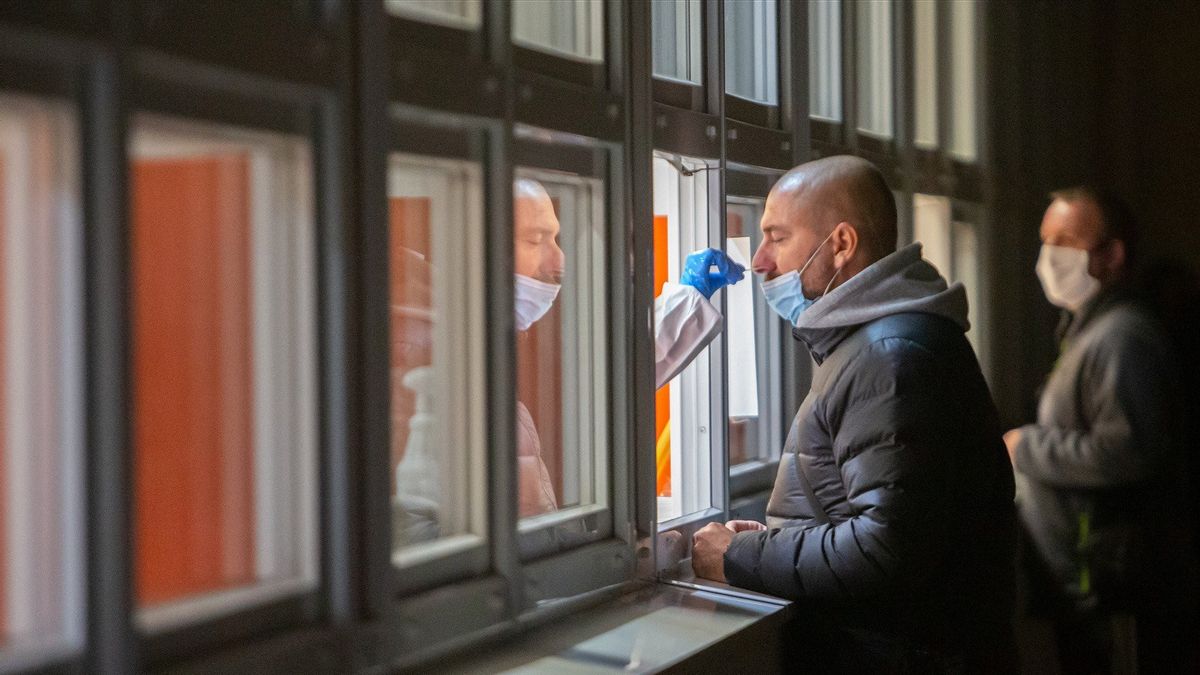JAKARTA - The mandatory implementation of the PCR test for airplane passengers is still a debate as the COVID-19 case in the country continues to decline. Member of Commission V of the DPR RI PKB Faction, Neng Eem Marhamah Zulfah, rejected the issuance of the Minister of Home Affairs Instruction (Inmendagri) 53/2021 concerning PPKM Levels 3, 2, and 1 in Java and Bali so that all airplane passengers must undergo PCR tests 2x24 hours before departure.
According to him, the Minister of Home Affairs is a step backwards in an effort to encourage economic revival in the country.
"The PCR test for airplane passengers as stated in the Minister of Home Affairs 53/2021 is a step back for efforts towards a new normal as the COVID-19 cases continue to slow down in the country," said Neng Eem, Thursday, October 21.
Neng Eem said, although currently there is a high limit on the price of the PCR test, for most people it is still relatively large. Even the price of this PCR test can be 50 percent of the price of a plane ticket. He also questioned the emergence of PCR test requirements in the Minister of Home Affairs 53/2021. The reason is, at Inmendagri 47/2021, the requirements for prospective airplane passengers are only in the form of an antigen test (H-1) provided that they have received a second dose of vaccination and a negative PCR result if they have just received the first dose of vaccine. public as a form of government siding with the PCR test organizers, which are currently growing in the field," said Neng Eem.
In addition, Neng Eem explained, strict restrictions during the COVID-19 pandemic in the past year and a half have hit the global aviation industry, including domestically. The International Air Transport Association (IATA) noted that the global aviation industry has suffered a loss of IDR 2.867 trillion over the past one and a half years. . The value of the loss, said Neng Eem, is equivalent to 9 years of collective income for the global aviation industry. Therefore, Neng Eem believes that the sloping down of the COVID-19 pandemic should be a momentum for the revival of the aviation industry in the country.
Moreover, he said, along with massive vaccinations and the application of protective care, there should no longer be a requirement for a PCR test for prospective airplane passengers. In fact, we get a lot of information if passengers have to forfeit their tickets because they have to wait for the results of the PCR test," he explained.
The reason PCR is still a mandatory requirement to board a plane
A negative PCR result is a mandatory requirement for boarding a plane even though the traveler has been vaccinated. The COVID-19 Task Force said this rule could better prevent the transmission of COVID-19.
Every user of air transportation, both those who have had the first dose or full dose of vaccine, is now required to show a negative result of the 2x24 hour PCR test. The spokesperson for the COVID-19 Handling Task Force Prof. Wiku Adisasmito conveyed the latest domestic travel regulations through a broadcast on BNPB Indonesia's Youtube, Thursday, October 21. "The domestic travel rules as stated in the Task Force Circular (SE) Number 21 of 2021, there is a change in the regulation of requirements for domestic travellers, namely tightening testing requirements to PCR only in air mode in the Java-Bali and non-Java-Bali levels 3 and 4. Considering that there is no longer any space between seats or seat distancing," said Wiku. Wiku explained that this policy was taken in the context of a trial of easing public mobility but still applying the precautionary principle. The PCR test is considered to be more effective in preventing the transmission of COVID-19 than before, only requiring vaccine requirements without a COVID-19 test. mobility with the precautionary principle," he said. "PCR as a more sensitive testing method can detect infected people better than rapid antigens so that the potential for infected people to pass detection and infect other people in dense capacity settings can be minimized," he continued. On the other hand, the latest policy allows children under the age of 12 to use public transportation modes, including planes. However, it should be noted that children must present negative evidence of a COVID-19 PCR test before traveling by plane. transportation to the destination," he concluded.
The English, Chinese, Japanese, Arabic, and French versions are automatically generated by the AI. So there may still be inaccuracies in translating, please always see Indonesian as our main language.
(system supported by DigitalSiber.id)










